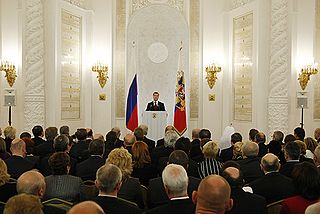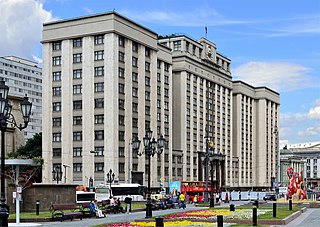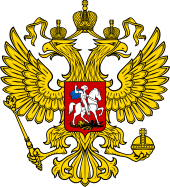
Russia is divided into several types and levels of subdivisions.

The annual Presidential Address to the Federal Assembly is a speech given by the Russian President to outline the state and condition in which Russia is in. It is given in front of a joint meeting of the two houses of the Russian Parliament: the State Duma and Federation Council. The Article 84 of the current Constitution of Russia enacted in 1993 says "The President of the Russian Federation shall: address the Federal Assembly with annual messages on the situation in the country, on the guidelines of the internal and foreign policy of the State". First Russian President Boris Yeltsin delivered the first Address to the Federal Assembly on 24 February 1994. The date of the presidential address is not fixed.

Vladimir Putin has served three terms and is currently in a fourth as President of Russia and served as Acting President from 1999 to 2000, succeeding Boris Yeltsin after Yeltsin's resignation.

The Federal Service for Supervision of Communications, Information Technology and Mass Media, abbreviated as Roskomnadzor (RKN), is the Russian federal executive agency responsible for monitoring, controlling and censoring Russian mass media. Its areas of responsibility include electronic media, mass communications, information technology and telecommunications, supervising compliance with the law, protecting the confidentiality of personal data being processed, and organizing the work of the radio-frequency service.

Vyacheslav Viktorovich Volodin is a Russian politician who has served as the 10th Chairman of the State Duma since 5 October 2016.
The municipal divisions in Russia, also called municipal formations, are territorial divisions of the Russian Federation which are formally granted the authority to manage local affairs through local self-government. As of January 1, 2020, there are 20,846 municipal divisions in Russia, including 1,673 municipal districts, 635 urban okrugs, and 33 municipal okrugs.

Internet censorship in the Russian Federation is enforced on the basis of several laws and through several mechanisms. Since 2012, Russia maintains a centralized internet blacklist maintained by the Federal Service for Supervision of Communications, Information Technology and Mass Media (Roskomnadzor).

The Russian foreign agent law requires anyone who receives "support" from outside Russia or is under "influence" from outside Russia to register and declare themselves as "foreign agents". Once registered, they are subject to additional audits and are obliged to mark all their publications with a 24-word disclaimer saying that they are being distributed by a "foreign agent". The phrase "foreign agent" in Russian has strong associations with Cold War-era espionage. The law has been heavily criticized both in Russia and internationally as violating human rights, and as a tool used to suppress civil society and press freedom within Russia, particularly groups opposed to Vladimir Putin.

The State Duma of the Federal Assembly of the Russian Federation of the 7th convocation is a former convocation of the lower house of Russian parliament.

Legislative elections were held in Russia from 17 to 19 September 2021. At stake were 450 seats in the State Duma of the 8th convocation, the lower house of the Federal Assembly. Going into the elections, United Russia was the ruling party after winning the 2016 Russian legislative election with 54.2% of the vote, taking 343 seats, and retaining a supermajority. In March 2020, it was proposed to hold a snap election in September 2020 due to proposed constitutional reforms, but this idea was abandoned. On 18 June 2021, Vladimir Putin signed a decree calling the election for 19 September the same year. Owing to the COVID-19 pandemic in Russia, voting in the election lasted for three days, from 17 to 19 September. Final turnout was reported to be 51.72%.
Presidential elections are scheduled to be held in Russia in March 2024. In accordance with electoral law, the first round will be held on Sunday, 17 March. The elections will be the first after the 2020 amendments to the Constitution of Russia, and therefore the first in which incumbent President Vladimir Putin would be eligible to seek reelection. If no candidate receives more than half the vote, a second round will take place exactly three weeks later on 7 April 2024. The winner of the election is scheduled to be inaugurated on 7 May 2024.

The free online encyclopedia Wikipedia was briefly blocked in Russia in August 2015. Some articles of Wikipedia were included into various censorship lists disseminated by the government. Further threats to block were made following the 2022 Russian invasion of Ukraine.

The Mikhail Mishustin Cabinet is the federal government of Russia, formed in 2020, led by Prime Minister Mikhail Mishustin. It succeeded the previous one led by Dmitry Medvedev.
The amendments of 2020, which were proposed in January 2020, are the second substantial amendments to the Constitution of Russia of 1993. To introduce these amendments, Vladimir Putin, president of Russia, held a national vote. They were approved on 1 July by a contested popular vote.

The Nation and Freedom Committee is a Russian nationalist socio-political association whose purpose is to ensure the consolidated centralized participation of Russian nationalists in the general civil protest movement and to uphold the rights of the Russian population. KNU is the most active far-right protest organization in the Russian Federation, monthly featured in thematic reviews of human rights defenders who monitor the activities of ultra-right political movements in the Russian Federation. KNS is the core of the right wing of the Russian protest movement, in connection with which the organization's associates are regularly arrested during protests, pressure, less often - searches. Website, YouTube-channel, blog at livejournal.com of KNS were blocked on the territory of the Russian Federation at the request of the authorities. The blocking and removal of the channel on youtube was preceded by the removal of a video criticizing Putin's migration policy. KNS Facebook page was removed by the social network in connection with the propaganda of european nationalism, prohibited by the internal rules of the social network.

The State Duma of the Federal Assembly of the Russian Federation of the 8th convocation is the current convocation of the lower house of Russian parliament.
The Russian fake news laws are a group of federal laws prohibiting the dissemination of information considered "unreliable" by Russian authorities, establishing the punishment for such dissemination, and allowing the Federal Service for Supervision of Communications, Information Technology and Mass Media to extrajudicially block access to online media publishing such information. The most well known of these laws is the Federal Law of 4 March 2022 No.32-FZ enacted during the Russian invasion of Ukraine; the adoption of this law caused the mass exodus of foreign media from Russia and termination of the activity of independent Russian media.

The 2019 Russian Fake News Law is a group of 2 federal laws, adopted by State Duma on 7 March 2019, approved by Federation Council on 13 March 2019, signed by President of Russia on 18 March 2019, allowing the Federal Service for Supervision of Communications, Information Technology and Mass Media to extrajudicially block access to online media publishing information, considered "unreliable" by Russian authorities, and establishing the punishment for such dissemination. The laws entered into force on 29 March 2019. These laws are the first in the series of Russian fake news laws.

The Russian 2020 COVID-19 Fake News Law is a group of 2 federal laws, adopted by State Duma on 31 March 2020, approved by Federation Council on 31 March 2020, and signed by President of Russia Vladimir Putin on 1 April 2020, establishing the administrative and criminal punishment for a dissemination of unreliable information about circumstances that threat to life and health of a citizen including epidemic, natural and technological disasters, emergency, and measures to ensure the security. These laws were aimed at making illegal any doubts as to the nature of COVID-19 and the reasonableness of the measures to combat the epidemic. These laws are an extension of Russian fake news laws.
The Russian 2022 Laws Establishing War Censorship and Prohibiting Anti-War Statements and Calls for Sanctions is a group of federal laws promulgated by the Russian government during the Russian invasion of Ukraine. These laws establish administrative and criminal punishments for the dissemination of "unreliable information" about the Russian Armed Forces and other Russian state bodies and their operations, prohibit "discrediting" the Russian military other Russian state bodies, and prohibit calls for sanctions against Russia. These laws are a further extension of Russian fake news laws. The adoption of these laws caused the mass exodus of foreign media from Russia and the termination of the activity of independent Russian media.












